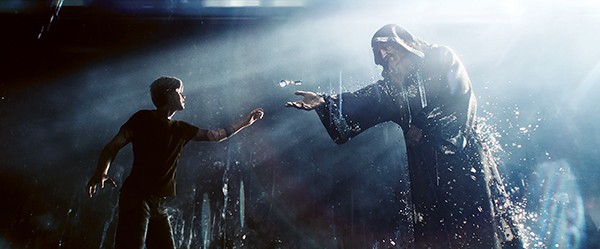When future digital archeologists look at the internet, I wonder what they will make of the millions of pages of stories about Kirk and Spock having sex. Or Buffy and Hermione’s doomed love affair. Or the novel-length work about wrapping Roy Orbison in cling film. (Google it and weep for humanity.)
Fan fiction, as this stuff is loosely called, predates the internet, but it was only with the coming of the world wide web that the art form could flourish. It’s not true that no one wants to read my carefully thought-out story of R2-D2’s rich inner life — maybe a hundred people would like it, and since they’re all on LiveJournal writing robosexual fantasies, I know where to find them.
Fanfic is a way for the consumers of popular culture to take control of it, even if it’s in a small, limited way. Its reputation for bad writing is well-earned, but it’s not all amateurs out there. The entire Fifty Shades of Grey franchise started life as as an extremely popular BDSM Twilight fanfic — author E.L. James just changed vampires to rich people. But discounting Roy Orbison in cling film, fanfic’s crowning achievement is Ernest Cline’s Ready Player One.
Cline’s protagonist Wade Watts lives in the teeming slums of the ruined future, but escapes into The Oasis, a fully immersive virtual world populated by billions who act out their fantasies in real time. Wade is one of thousands of other players on a years-long quest to solve a series of puzzles set out by James Halliday, the system’s creator. Halliday’s obsession was popular culture he loved as a kid, so Ready Player One’s great game is steeped in 1980s references, from Advanced Dungeons and Dragons to Zork. The first to find the three hidden keys can unlock the “easter egg” and be awarded ownership of the entire system.
The late creator envisioned a Willy Wonka scenario, but control of this virtual world would be fantastically lucrative, so Innovative Online Industries (IOI) CEO Nolan Sorrento is spending a lot of money and manpower to leverage gaming as a form of hostile corporate takeover. When Wade makes a breakthrough in the game, he becomes the target of Sorrento, who pursues him in both the virtual and real worlds.

Ready Player One is no literary masterpiece, but it is a good beach read. Once it became a bestseller, it was kind of inevitable that the film adaptation would be directed by Steven Spielberg, the man responsible for much of the ’80s aesthetic Cline is nostalgic for. Spielberg got Industrial Light and Magic on board, and worked his wizardry. He and screenwriter Zak Penn sanded off the book’s rough edges and worked around the inevitable intellectual property licensing conflicts inherent in a story that climaxes with Voltron dueling Mechagodzilla. (There’s a glaring lack of Star Wars, for example, and Voltron is demoted to just “a gundam.”)
Eager as I was to see the director of Raiders of the Lost Ark bring D&D creator Gary Gygax’s trap-tastic Tomb of Horrors to life, Spielberg’s virtuosic comedy-action sequence built around The Shining more than justifies his decision to dial back the book’s more esoteric digressions. But you don’t have to be a hopeless geek like me to get it when everything clicks, like when Wade (Tye Sheridan) and his Magic Pixie Dream Girl Art3mis (Oliva Cooke) float into an ethereal zero-G dance club with “Blue Monday” booming over the sound system. Cline’s book wants to be edgy YA dystopian fiction, but in Speilberg’s hands, it’s more Who Framed Roger Rabbit?
As long as he delivers the goods, Spielberg could be forgiven if he just made a delicious confection. But this film, though steeped in nostalgia, feels very much of the moment. As Sorrento, Ben Mendelsohn is doing a sly imitation of Principal Vernon from The Breakfast Club, but he’s also Mark Zuckerberg, seeking to control the world through domination of information flows. Mark Rylance plays Oasis creator Halliday as the archetypal computer geek hero who wants both information and people to be free. The characters believe their assumed online identities are more real than the ones they’re stuck with IRL.
Ready Player One is a lot of fun, but it also feels like the end of something. Now that Spielberg is filming his own fanfic, maybe postmodernism has reached its final form. Remixing the past is all fine and good, but now it’s time to go back to the future.
